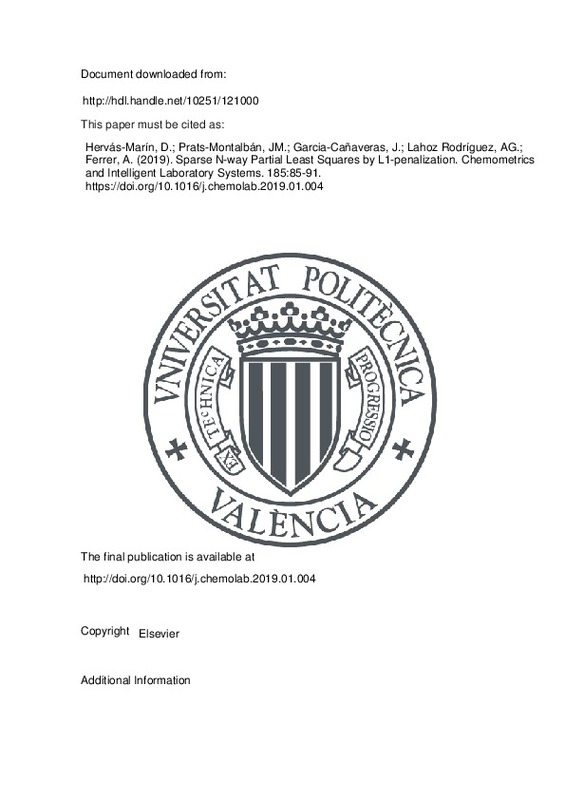JavaScript is disabled for your browser. Some features of this site may not work without it.
Buscar en RiuNet
Listar
Mi cuenta
Estadísticas
Ayuda RiuNet
Admin. UPV
Sparse N-way Partial Least Squares by L1-penalization
Mostrar el registro sencillo del ítem
Ficheros en el ítem
| dc.contributor.author | Hervás-Marín, David
|
es_ES |
| dc.contributor.author | Prats-Montalbán, José Manuel
|
es_ES |
| dc.contributor.author | Garcia-Cañaveras, J.C.
|
es_ES |
| dc.contributor.author | Lahoz Rodríguez, Agustín Gerardo
|
es_ES |
| dc.contributor.author | Ferrer, Alberto
|
es_ES |
| dc.date.accessioned | 2019-05-23T20:02:27Z | |
| dc.date.available | 2019-05-23T20:02:27Z | |
| dc.date.issued | 2019 | es_ES |
| dc.identifier.issn | 0169-7439 | es_ES |
| dc.identifier.uri | http://hdl.handle.net/10251/121000 | |
| dc.description.abstract | [EN] N-PLS, as the natural extension of PLS to N-way structures, tries to maximize the covariance between an X and a Y N-way data arrays. It provides a useful framework for fitting prediction models to N-way data. However, N-PLS by itself does not perform variable selection, which indeed can facilitate interpretation in different situations (e.g. the so-called ¿¿omics¿ data). In this work, we propose a method for variable selection within N-PLS by introducing sparsity in the weights matrices WJ and WK by means of L1-penalization. The sparse version of N-PLS is able to provide lower prediction errors by filtering all the noise variables and to further improve interpretability and usability of the N-PLS results. To test Sparse N-PLS performance two different simulated data sets were used, whereas to show its utility in a biological context a real time course metabolomics data set was used. | es_ES |
| dc.language | Inglés | es_ES |
| dc.publisher | Elsevier | es_ES |
| dc.relation.ispartof | Chemometrics and Intelligent Laboratory Systems | es_ES |
| dc.rights | Reconocimiento - No comercial - Sin obra derivada (by-nc-nd) | es_ES |
| dc.subject | N-PLS | es_ES |
| dc.subject | LASSO | es_ES |
| dc.subject | Variable selection | es_ES |
| dc.subject | Multiway models | es_ES |
| dc.subject.classification | ESTADISTICA E INVESTIGACION OPERATIVA | es_ES |
| dc.subject.classification | QUIMICA ORGANICA | es_ES |
| dc.title | Sparse N-way Partial Least Squares by L1-penalization | es_ES |
| dc.type | Artículo | es_ES |
| dc.identifier.doi | 10.1016/j.chemolab.2019.01.004 | es_ES |
| dc.rights.accessRights | Abierto | es_ES |
| dc.contributor.affiliation | Universitat Politècnica de València. Departamento de Química - Departament de Química | es_ES |
| dc.contributor.affiliation | Universitat Politècnica de València. Departamento de Estadística e Investigación Operativa Aplicadas y Calidad - Departament d'Estadística i Investigació Operativa Aplicades i Qualitat | es_ES |
| dc.description.bibliographicCitation | Hervás-Marín, D.; Prats-Montalbán, JM.; Garcia-Cañaveras, J.; Lahoz Rodríguez, AG.; Ferrer, A. (2019). Sparse N-way Partial Least Squares by L1-penalization. Chemometrics and Intelligent Laboratory Systems. 185:85-91. https://doi.org/10.1016/j.chemolab.2019.01.004 | es_ES |
| dc.description.accrualMethod | S | es_ES |
| dc.relation.publisherversion | http://doi.org/10.1016/j.chemolab.2019.01.004 | es_ES |
| dc.description.upvformatpinicio | 85 | es_ES |
| dc.description.upvformatpfin | 91 | es_ES |
| dc.type.version | info:eu-repo/semantics/publishedVersion | es_ES |
| dc.description.volume | 185 | es_ES |
| dc.relation.pasarela | S\375922 | es_ES |







![[Cerrado]](/themes/UPV/images/candado.png)

